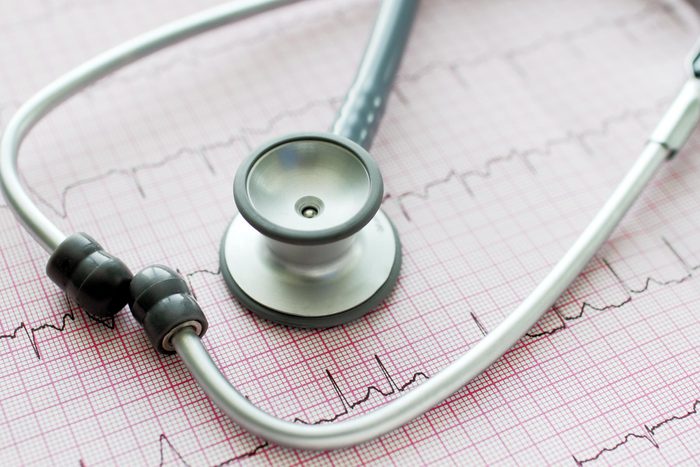6 Silent Signs of AFib, According to a Cardiologist
Updated: Jul. 25, 2024

An irregular heartbeat can raise your risk for heart failure and stroke. With up to 6 million Americans estimated to have AFib, cardiologists highlight who should get screened.
Atrial fibrillation (AFib) affects an estimated three million to six million Americans—and a 2020 Journal of the American Medical Association (JAMA) study suggested the rate of AFib incidence is increasing by about three percent each year.
Untreated AFib increases the risk of stroke, heart failure, and other heart-related complications—and while age is a risk factor, another 2021 study from the American Heart Association (AHA) found that deaths related to AFib are rising among younger people aged 35 to 64.
It makes you want to keep an eye out for Afib symptoms, but AFib can be tricky to recognize. While it’s the most common type of heart arrhythmia (which you can think of as an irregular heartbeat), there are high rates of undiagnosed AFib in the US, according to a 2023 report in Clinical Cardiology.
“In about one-third of patients, [AFib] is asymptomatic,” says Guy Rozen, MD, co-director of the New England Arrhythmia Center and director of the Atrial Fibrillation Program at Tufts Medical Center. There are, however, several risk factors associated with Afib—and because the condition tends to be highly treatable when it’s caught early, heart doctors want you to know your personal risk and potential AFib warning signs to look out for…especially because they can be subtle.
What is AFib?
The heart has four chambers: Two upper and two lower. The heart’s electrical activity starts at the top—the atrium—and spreads down to the lower ventricles, explains Jessica Hennessey, MD, a sports cardiologist and cardiovascular disease specialist at NewYork-Presbyterian/Columbia University Irving Medical Center. This activity creates a regular, clock-like heartbeat that pumps blood steadily through the rest of your body.
But in cases of atrial fibrillation, the heart’s atrium is out of sync with its ventricle chambers. Instead of maintaining a coordinated rhythm, “the atrium is sort of quivering and firing at a very high rate,” Dr. Hennessey says. This can trigger chaotic heart patterns, poor movement of blood, and if it’s left untreated, can lead to heart failure and stroke.
Most Heart Attacks Happen on This Day of the Week, Says New Study
What are the stages of AFib?
In most people, AFib is a progressive condition that evolves through three stages, says Dr. Rozen. These AFib stages include:
-
Paroxysmal Atrial Fibrillation: Episodes of arrhythmia that are relatively short, up to seven days.
-
Persistent Atrial Fibrillation: More frequent episodes that last for longer than seven days.
-
Permanent Atrial Fibrillation: When your heart stays in a constant state of AFib.
However, not all people will progress to the later stages of AFib, especially if the arrhythmia is caught and managed early. Recent research shows that treatment with medication or outpatient procedures can significantly lower the risk of developing persistent AFib. In addition, 2019 research in the Journal of the American Heart Association suggested a healthy lifestyle limits the likelihood of AFib progression.
This Is the Best Diet for Your Heart, Says New Report
AFib symptoms

“Unfortunately, the first sign of atrial fibrillation can be a stroke as some patients are truly asymptomatic,” Dr. Hennessey says. “This is due to the quivering of the atrium (the upper heart chamber) leading to slow blood flow, which can form clots. These clots can get pumped up to the brain, which is what leads to a stroke.”
This sort of unexplained stroke is the number one “symptom” that suggests an individual needed to be actively screened for AFib, Dr. Rozen explains.
He says that among people who do experience AFib warning signs, patients often describe:
- Heart palpitations, feeling like the heart is racing, thumping, or fluttering irregularly
- Chest discomfort, pressure, or pain
- Shortness of breath
- Spells of dizziness, lightheadedness, and confusion
- General fatigue, weakness, and a lack of energy
- “Effort intolerance”: The inability to perform normal activities, exercise, or movement
11 Silent Signs of Heart Trouble You Shouldn’t Ignore
When to check with your doctor about AFib symptoms
One challenge in narrowing in on an AFib diagnosis is that some of these symptoms can be non-specific. For example, general weakness and occasional lightheadedness don’t necessarily point to a cardiac problem, Dr. Rozen explains. It’s a good idea to check in with your doctor to help understand if these issues are related to a heart condition or any other health issue.
When to get an AFib test with your doctor
Symptoms such as heart palpitations and shortness of breath with exertion are more likely to suggest a case of AFib, says Dr. Hennessey—especially if they occur alongside these “non-specific” symptoms like fatigue and dizziness. If you experience this combination of symptoms—palpitations, shortness of breath, dizziness, or fatigue—“You should see your doctor and have an ECG or heart monitor performed to assess for atrial fibrillation,” she says.
When to call 911
Importantly, Dr. Hennessey says that chest pain and lower extremity swelling (a sign of heart failure) are considered severe symptoms of AFib that require immediate medical attention. Chest pain, in particular, warrants a 911 call, she emphasizes.
59 Health Symptoms You Should Never Ignore
Am I at risk for AFib?
While AFib doesn’t always cause physical symptoms, certain risk factors are associated with developing the heart condition. Regular AFib screening (like during an annual physical exam) is not currently recommended by the US Preventive Services Task Force, citing insufficient research available to demonstrate a net benefit to widespread AFib screening.
That said, people with risk factors for AFib should work with their doctor to monitor for the condition. This includes those with high blood pressure, heart disease, a family history of AFib, diabetes, hyperthyroidism, chronic kidney disease, obesity, obstructive sleep apnea, or heavy alcohol or tobacco use.
Keep in mind that the greatest risk factor for AFib is advancing age, according to Dr. Rozen.
Still, undiagnosed AFib is in decline, he says—largely thanks to the widespread use of personal devices like smartwatches that automatically detect when your heart is in AFib. The fact that AFib often comes and goes means that a patient’s heart rhythm can be completely normal when they’re at the doctor’s office, while an hour earlier, they could have been in AFib.
I Did Everything My Smart Watch Told Me to Do for a Month—Here’s What Happened
Today’s wearable monitors are helping physicians and patients better track, diagnose, and treat AFib than ever before, say both heart doctors. “However, these monitors are not 100% accurate,” Dr. Hennessy says. “If you suspect anything, it’s important to speak with your doctor immediately.”
For wellness wisdom delivered daily, get The Healthy @Reader’s Digest newsletter and follow The Healthy on Facebook, Instagram, and Twitter. Keep reading:



















